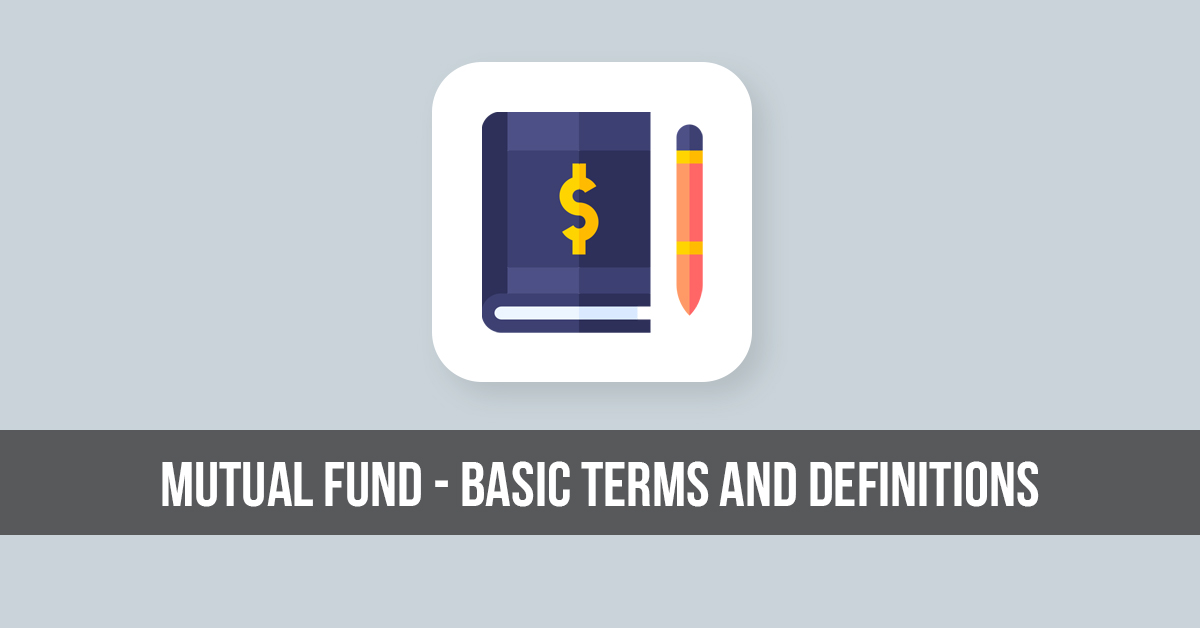Last updated on October 9th, 2023 at 01:03 pm

Mutual Funds are great option for investment. But you should understand basic terms used by fund house to understand a scheme and its characteristics.
Here we are providing general terms used in defining a Mutual Fund scheme.
Thus to choose a good fund that suits you, you should understand the following terms.
MUTUAL FUND
Mutual Fund is an investment option in which a company pools money from multiple investor and invests in securities like Stocks, bonds, money marker instruments etc.
Investment in Mutual Fund helps individual to diversify their money by investing in variety of securities. A person can start his investment with a low amount.
ASSET MANAGEMENT COMPANY (AMC)
Asset Management Company (AMC) is a company with a professional investors who manages individual investors money. They collect money from investors and do the investment.
AMC usually provides various types of Mutual Fund, each with specific objective and investment plan. The investment objective is based on the type of Mutual Fund Scheme chosen.
EQUITY SCHEME
The Scheme in which the investment is primarily done on Equity and Equity related investments i.e. in stock market are called Equity Scheme.
Equity schemes are better suited for the people with high risk appetite and long term investment plan. as the equity related securities are high volatile.
Overtime the return is better than other direct security investment options. But this type of Mutual Fund is not suitable for short term investment.
DEBT SCHEME
The Scheme in which the investment is done primarily on Bonds and Debt related securities.
These are low risk Mutual Funds as the invested securities usually have a fixed rate of return.
Debt Schemes are suitable for the people with an objective of less risk and moderate return.
HYBRID SCHEME
In this Scheme the fund is invested in both Debt and Equity securities. The share of investment in each security is decided based on the investment objective.
This further diversifies the investment hence counterbalancing the loss in a one market with the other.
INDEX FUND
Investment done on purely based on the market Index i.e., invests in top companies in stock market. Fund manager does not decide on the stocks invested.
Index Funds are very low risk investment option as it invests only in well established companies.

NET ASSET VALUE (NAV)
Total invested amount in Mutual Fund Scheme is divided into small units with less price. The price of this unit is called NAV.
i.e., Net Asset Value (NAV) is represents value of a Mutual Fund Scheme on a smaller scale.
For example a Mutual Fund scheme with 100 units and NAV of Rs.10 has a Total Fund of Rs.1000.
i.e., Total fund in Management = NAV * Total Units
Also Read: What is E Rupee? Exploring India’s Digital Currency
UNITS
As explained above Units represent the investment of an individual in a particular Mutual Fund scheme.
Unit representation of Investment is easy to understand the value of fund. Further it is easy to do trade with units.
HOLDING
Holding is the current value of your investment in the Mutual Fund. It includes return on investment or excludes loss on investment.
Though Holding is continuously changing with values of the stock invested, AMC declares the holding at the day end.
Portfolio
Portfolio of a scheme gives the details of various securities and bonds invested in the scheme.
Hence understanding a portfolio is important to monitor the progress of your fund over time.
Systematic Investment Plan (SIP)
Systematic Investment Plan is an option to repeatedly invest smaller amount over longer duration.
SIP can withstand short term down Market Movement.
Systematic Withdrawal Plan (SWP)
Systematic Withdrawal Plan is as the name suggests is a withdrawal of investment from Mutual Fund.
In SWP withdrawal happens over long duration.
Systematic Transfer Plan (STP)
Systematic Transfer Plan is an option to transfer fund from one scheme to another scheme in a systematic manner.
It allows investor to transfer fund between schemes at a predefined time with predefined amount.
AMFI
Association of Mutual Funds in India (AMFI) is an apex organisation to regulate Mutual Fund in India.
It is a subsidiary of Security and Exchange Board of India (SEBI), AMC should have a membership with AMFI for issuing Mutual Fund Scheme.
EXPENSE RATIO
Expense ratio is the expenses of the AMC. It includes cost incured for managing and operating the fund.
Higher expense ratio will considerably reduce your return over a long term.
EXIT LOAD
Fee collected by Fund House for withdrawing invested amount from the scheme.
Exit Load is applicable if the amount is withdrawn before the lock in period.
CONCLUSION
We here explained some of the common terms used in Mutual Fund. Knowing these basic terms will help you in understanding and comparing various the fund.
